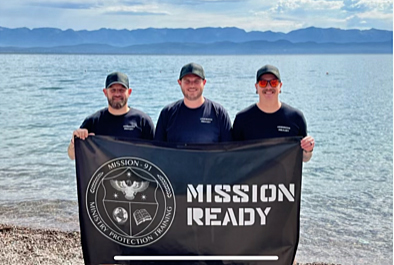Today is a big day for Lake Highlands High School graduate Luke Smith. The emergency medical technician is part of a four-man team headed to Ukraine to provide aid and training to war-weary civilians.
Smith is part of Mission Builders International’s Mission 91, a nonprofit providing protection services for churches and ministries around the world. The group has traveled to Cambodia, Nepal, Thailand, Nigeria, Mexico, Kansas City, Detroit, Los Angeles and other hotspots to advise organizations on risk mitigation and de-escalation techniques to keep parishioners and staff members safe.
Mission 91 focuses on the realities of what to do if an armed intruder came onto the campus of a church or ministry, and they teach prioritized responses such as “escape, barricade, engage.” Smith’s specialty as an EMT is crafting a life-saving crisis response plan, including CPR and stop-the-bleed training. Teammate Matt Praetzel focuses on recognizing threats and de-escalating verbal and physical conflict. J.T. Pharr, a former Marine, works to improve physical security on campuses, including cameras, lighting, doors, windows and blind spots.
Mission 91 prepares ministries to recognize and deal with “anomalies,” but they don’t believe in “fear mongering.” Most groups have only a small chance of encountering significant threats, they say.
“It could just be someone who’s down and needs someone to talk to. That’s a ministry opportunity. They don’t want to become bouncers for the church,” Smith says. “We want everyone to feel welcome, but if something feels off, we need to explore that and approach that person before anything goes wrong. A good security team — especially for a church or ministry — you don’t even know they’re there. They just look like another set of greeters.”
Over the next two weeks in Ukraine, two members of the team will provide medical training for civilian combat medics. Military medics are only authorized to treat military personnel, so civilians are needed to support large numbers of wounded Ukrainian citizens.
“With the war happening all around them, many civilians are dying from injuries sustained from bombs and landmines,” Smith says. “Many deaths are preventable, because life saving measures are simple and effective.”
The team will take with them $50,000 in medical equipment weighing 500 pounds, including tourniquets, wound packing materials, gauze, hemostatics and other items. If their trainees encounter serious wounds, they’ll be equipped to stop the bleeding until more specialized treatment can be secured.
The other two guys will deliver humanitarian aid and help evacuate civilians from combat zones. They’ll also train locals in techniques for food storage and delivery, since hunger has been a significant hardship in some areas during the war.
The team has seen difficult circumstances in other places across the globe, but they know this trip may be especially tough.
“We’re expecting to see a shell-shocked population,” Smith says. “The war has been going on since 2014. The world really learned of it last year with the bigger push by Russia, but Russia’s been going after land in the Crimea area since 2014. The Ukrainians are used to Russian aggression, but this is a whole new level. They’re just looking for any help they can get.”
Smith believes his training and experience as an EMT will come in particularly handy.
“As a first responder, I’m expecting to see sadness and people who haven’t dealt with compounded trauma. At some point, your world view changes. We may see some mental health challenges, and I hope we can speak to some of that.”
Smith’s team is working closely with other ministries who’ve been in Ukraine for years. They’ve been consulting with individuals who’ve gone before them, and some of what they’ve heard is surprising.
“They tell us there’s no doubt there’s a war on — that we’ll travel through numerous checkpoints with armed guards and see injuries and trauma wherever we go. But they also say, staying in the cities, it can become ‘business as usual.’ Businesses are functioning and people are going about their daily lives.”
If you’d like to support Mission Builders International, you may donate here.






